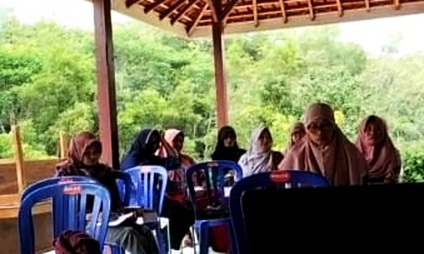By Trustha Rembaka.
Education
must reach every element of society, covering age groups, various backgrounds, and
residents in an urban and rural areas, so that people have access to
development and welfare. Everyone or institution must have a spirit to progress by
taking part in bridging the gap in education, economy, technology, and others.
This spirit also exists within Stube HEMAT Yogyakarta by responding to a collaboration
with students group for field works in Tileng, Girisubo, Gunungkidul, by
sending Trustha Rembaka as training facilitator on Maritime-based Creative
Economy and Environmental Conservation at Sekolah Alam Pesisir, Tileng village
(Sunday, 14/8/2022). This is a follow-up of Education in Advanced Technology:
Leaving No One Behind.
Tileng
Village is one of the villages in kapanewon (district) Girisubo, Gunungkidul
regency with an area of 17.721 hectares which is directly adjacent to the
Indian Ocean along 7,2 km with cliffs. The area has three areas, settlement,
dry fields or rainfed rice fields, and sea borders or coastal areas. The
population is 4.336 people, the majority of whom work as rain-fed farmers and
ranchers.
In
the discussion, Trustha explained that Tileng village is one of the pioneers of
maritime villages in the Special Region of Yogyakarta to improve the people’s
welfare. This is a manifestation of the Governor of DIY's vision to make the
south coast to be the front yards and to increase the welfare of the community. The maritime
economy is a pillar of the economy on the south coast of DIY, not only relying
on fisheries and marine but also agriculture and tourism. The first step covers
the development of human resources through the Sekolah Alam Pesisir (Coastal
Nature School), training on marine fish processing, and loan for farmers and
fishermen. This is a good opportunity to realize the welfare of the community
if they know what to do, what the potencies are, how to develop it, and who is
taking part. The facilitator guided a group discussion consisting of fishermen,
workers who process seafood, farmers, and traders. They identified the
potencies of the sea, fields, trade, and tourism, and listed what they produced
from the marine fish products, shredded tuna and nuggets from tuna, several
types of vegetables, peanuts, and sweet potatoes. Furthermore, the facilitator
and the participants explored the development of product processing, such as
fish fillets, and variants of nuggets, and identified the unique flavors of fish.
On the topic of environment conservation, the facilitator asked participants to mention the beaches in Gunungkidul and their uniqueness, including Sadeng beach as a port, Jogan beach with waterfalls, and Nglambor beach with its snorkeling area. He also reminded the participants about the existence of beach tourism in Gunungkidul is growing, on one hand, it brings income, but on the other hand, the utilization of beaches without ecological study changes the environmental balance, even damage, for example, toilet disposal waste, packaged food waste, and food waste, destruction of karst cliffs for road access, until the loss of natural habitat for turtles to lay eggs, where Gunungkidul is a nesting place for the world's rare turtles. The existence of the Sekolah Alam Pesisir (Coastal Nature School) can be a medium for public education to get the benefits of maritime welfare without harming the environment's sustainability.
From
this discussion, one of the participants, Mujito revealed that he found new
insights about the Tileng village's economic growth opportunities, from the
sea with fish products that can be processed into various processed products,
developing cassava into chips and ‘patilo’ products, processing peanuts into
crackers and various egg-flavored peanuts.
The community's enthusiasm to learn and achieve a progressive life needs to be accompanied by the availability of community learning facilities and the ease of accessing them. It is where the stakeholders must act, even though the village is outskirt but no longer marginalized. Keep growing Tileng village. ***



.png)






Comments
Post a Comment